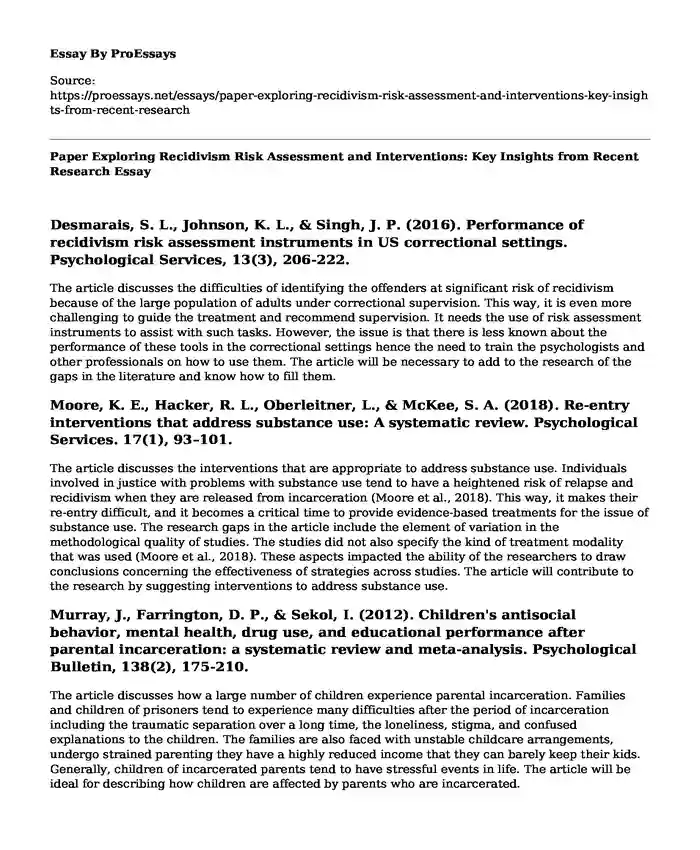Desmarais, S. L., Johnson, K. L., & Singh, J. P. (2016). Performance of recidivism risk assessment instruments in US correctional settings. Psychological Services, 13(3), 206-222.
The article discusses the difficulties of identifying the offenders at significant risk of recidivism because of the large population of adults under correctional supervision. This way, it is even more challenging to guide the treatment and recommend supervision. It needs the use of risk assessment instruments to assist with such tasks. However, the issue is that there is less known about the performance of these tools in the correctional settings hence the need to train the psychologists and other professionals on how to use them. The article will be necessary to add to the research of the gaps in the literature and know how to fill them.
Moore, K. E., Hacker, R. L., Oberleitner, L., & McKee, S. A. (2018). Re-entry interventions that address substance use: A systematic review. Psychological Services. 17(1), 93–101.
The article discusses the interventions that are appropriate to address substance use. Individuals involved in justice with problems with substance use tend to have a heightened risk of relapse and recidivism when they are released from incarceration (Moore et al., 2018). This way, it makes their re-entry difficult, and it becomes a critical time to provide evidence-based treatments for the issue of substance use. The research gaps in the article include the element of variation in the methodological quality of studies. The studies did not also specify the kind of treatment modality that was used (Moore et al., 2018). These aspects impacted the ability of the researchers to draw conclusions concerning the effectiveness of strategies across studies. The article will contribute to the research by suggesting interventions to address substance use.
Murray, J., Farrington, D. P., & Sekol, I. (2012). Children's antisocial behavior, mental health, drug use, and educational performance after parental incarceration: a systematic review and meta-analysis. Psychological Bulletin, 138(2), 175-210.
The article discusses how a large number of children experience parental incarceration. Families and children of prisoners tend to experience many difficulties after the period of incarceration including the traumatic separation over a long time, the loneliness, stigma, and confused explanations to the children. The families are also faced with unstable childcare arrangements, undergo strained parenting they have a highly reduced income that they can barely keep their kids. Generally, children of incarcerated parents tend to have stressful events in life. The article will be ideal for describing how children are affected by parents who are incarcerated.
Viljoen, J. L., Jonnson, M. R., Cochrane, D. M., Vargen, L. M., & Vincent, G. M. (2019). Impact of risk assessment instruments on rates of pre-trial detention, postconviction placements, and release: A systematic review and meta-analysis. Law and Human Behavior, 43(5), 397-420.
The source describes the impact of risk assessment instruments on the rates of detention and release. The use of risk assessment instruments by agencies is to guide the decisions concerning pre-trial detention, incarceration, and getting released from custody. The tools are believed to reduce the rate of over-incarceration and recidivism. However, there are others who think that the tools may exacerbate racial and ethnic disparities in placements. The article will be necessary to add more information to researching for gaps and knowing how to fulfill them.
Hamilton, Z., Kigerl, A., Campagna, M., Barnoski, R., Lee, S., Van Wormer, J., & Block, L. (2016). Designed to fit: The development and validation of the STRONG-R recidivism risk assessment. Criminal justice and behavior, 43(2), 230-263.
The source discusses the study to examine offender risk assessment development. The study seeks to address the objectives such as identifying the concepts and issues that vary with the provisions of modeling and prediction. Risk assessment is made up of different complexities with the use of predictive indicators of behaviour. The article will be vital to determine the use of the tools to assess risks.
References
Desmarais, S. L., Johnson, K. L., & Singh, J. P. (2016). Performance of recidivism risk assessment instruments in US correctional settings. Psychological Services, 13(3), 206-222. https://www.researchgate.net/profile/Jay_Singh10/publication/303828802_Performance_of_Recidivism_Risk_Assessment_Instruments_in_US_Correctional_Settings/links/5a24781d0f7e9b71dd073f22/Performance-of-Recidivism-Risk-Assessment-Instruments-in-US-Correctional-Settings.pdf
Hamilton, Z., Kigerl, A., Campagna, M., Barnoski, R., Lee, S., Van Wormer, J., & Block, L. (2016). Designed to fit: The development and validation of the STRONG-R recidivism risk assessment. Criminal justice and behavior, 43(2), 230-263. https://static1.squarespace.com/static/5935ee95893fc011586f1304/t/5b4e526770a6adbf63f35603/1531859562706/Designed+to+Fit+-+Hamilton+et+al.+2016.pdf
Moore, K. E., Hacker, R. L., Oberleitner, L., & McKee, S. A. (2018). Re-entry interventions that address substance use: A systematic review. Psychological Services. 17(1), 93–101. https://eds-a-ebscohost-com.ezp.waldenulibrary.org/eds/pdfviewer/pdfviewer?vid=2&sid=a9a86452-6acc-4a05-ae97-59978c999b8f%40sdc-v-sessmgr03
Murray, J., Farrington, D. P., & Sekol, I. (2012). Children's antisocial behavior, mental health, drug use, and educational performance after parental incarceration: a systematic review and meta-analysis. Psychological Bulletin, 138(2), 175-210. https://psycnet.apa.org/fulltext/2012-00399-001.html
Viljoen, J. L., Jonnson, M. R., Cochrane, D. M., Vargen, L. M., & Vincent, G. M. (2019). Impact of risk assessment instruments on rates of pre-trial detention, postconviction placements, and release: A systematic review and meta-analysis. Law and Human Behavior, 43(5), 397-420. https://psycnet.apa.org/fulltext/2019-46921-001.html
Cite this page
Paper Exploring Recidivism Risk Assessment and Interventions: Key Insights from Recent Research. (2024, Jan 10). Retrieved from https://proessays.net/essays/paper-exploring-recidivism-risk-assessment-and-interventions-key-insights-from-recent-research
If you are the original author of this essay and no longer wish to have it published on the ProEssays website, please click below to request its removal:
- Three Ways that Are Important to Having a Happy Life
- Nursing Scholarship Application Letter
- Problem Solution Proposal: Suicide in Japan
- Effects of Videogames on Adolescents Essay
- Counseling Reflection & Growth Plan: Mental Health & Life Goals - Essay Sample
- Essay Example on Jane's 2nd Admisn: Psychotic Episodes & Depression
- Nursing Self Reflection - Essay Sample







